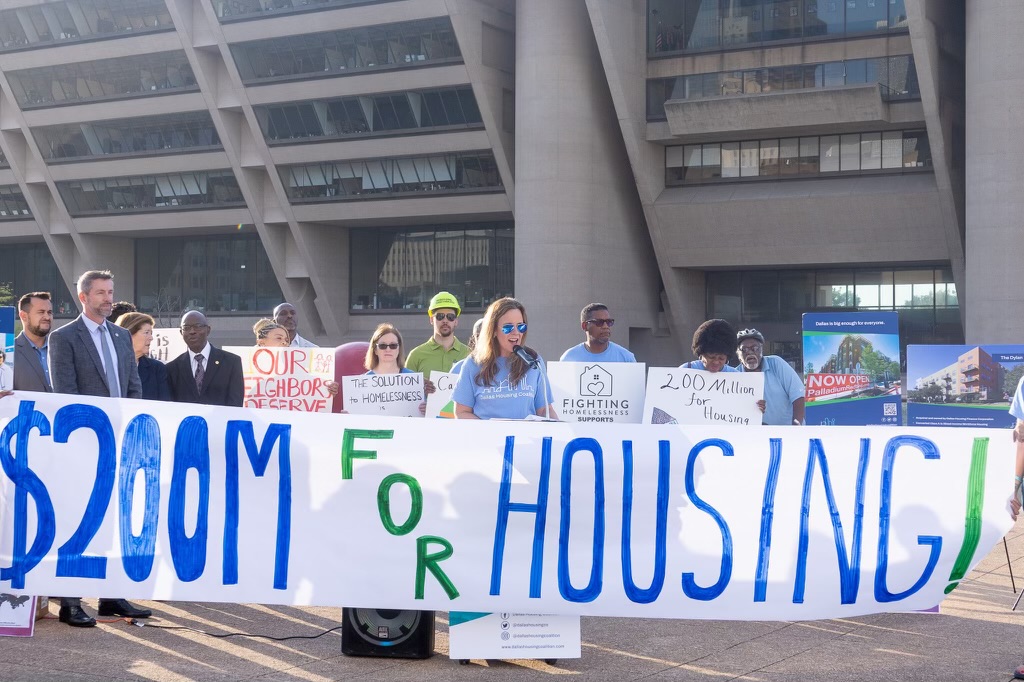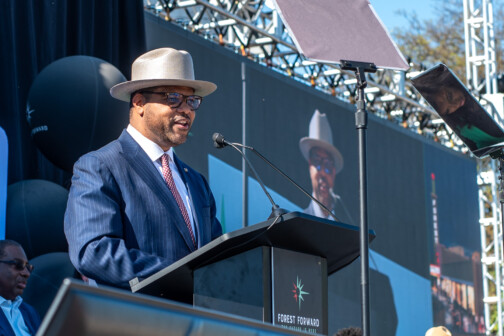Last July, Ashley Brundage led the first of many rallies in which she called on the city to fund affordable housing in this year’s bond. Her group, the Dallas Housing Coalition, pushed for a $200 million spend. The bond wound up allocating about $70 million for help with financing and infrastructure improvements near affordable housing. Even though it fell short of the more ambitious ask, this is still a significant achievement for housing advocates, if only because the city of Dallas has never viewed a bond program as a way to directly invest in creating more places for people to live.
This month, Brundage was announced as the new leader of the Dallas chapter of Habitat for Humanity, one of the region’s largest homebuilders. She’s spent the last 19 years with United Way, and, for the last 17, was the organization’s executive director of housing stability. That meant, during the pandemic, Brundage helped raise and disburse $40 million of rental assistance that helped people stay in their homes.
Habitat has had a rough go of it in recent months. The former CEO, William Eubanks III, parted ways with the organization after a Dallas Morning News investigation found that his wife earned a $24,000 commission on land purchased by the nonprofit. (Eubanks denied wrongdoing.) Too, the City Plan Commission denied Habitat’s plan to build 30 homes on an old ballfield following pushback from the community.
Brundage sees her role as rebuilding trust with the communities Habitat serves—it owns land in Joppa and Pleasant Grove, and is working in Irving and Kaufman County—and using her knowledge and background to position Habitat as a thought-leader and policy advocate. Too, the organization’s finances are in a much different place than they were in 2018, when the News floated that the organization “might be failing” following years of losses.
Philanthropist Mackenzie Scott, the ex-wife of billionaire Jeff Bezos, gave the organization $9 million in 2022. “That allows me to be able to come in and not feel like we’re in any kind of crisis,” Brundage says, which will allow her to hire her team and create a new strategic plan.
With early voting on the bond ongoing through next Tuesday, April 30, Brundage talked about the need for housing, her vision for Habitat’s Dallas chapter, and how important community involvement is for the organization’s projects. The conversation below has been edited for length and clarity. (Afterward, head here to read our guide to the bond package. It includes details about the housing allotments.)
You’ve spent nearly two decades in the housing space with United Way. This is a big question, but how has our market shifted over those years? It seems we’re at an inflection point, where it’s clear that we aren’t adding the supply necessary to moderate prices.
I think what we’re seeing is just the changing economy in North Texas, right? A lot of folks have started to move here, especially right before COVID, from other states like California. And we knew heading into COVID that we were already experiencing a housing crisis. It wasn’t really being highlighted or lifted up or recognized, because it was only really impacting folks who were already living in poverty, where they were feeling the biggest squeeze before we went into the pandemic.
There was a lot of money flowing into the economy, there was a lot more homes being purchased above asking price. During COVID, the middle-income folks started getting squeezed, and that’s when more recognition started growing around the housing crisis, unfortunately, because higher income people were starting to be priced out of the housing market. And that hasn’t stopped. It has only gotten worse, and we have not done anything significant in North Texas to be able to really address that.
We need to follow some of what Austin has done as far as increasing the supply of housing. Then the demand can be met, and you’ll see prices even out more in that middle income area. But we also need to double down on the creation of lower income levels and lower rents and home purchasing levels, so that we can reach the people who are experiencing that squeeze to begin with. We’re going to have to use subsidies, we’re going to have to get creative and innovative with different ideas. We should look to Houston for the changes in minimum lot size and density, but really try to come up with some a mix of solutions so that we can hit all the different price points and housing that are needed to really have a diverse community that we want to see across the Dallas area.
So how do you see Habitat fitting into that solution?
Habitat for Humanity is at a really critical inflection point as an organization. We have the opportunity to reinvigorate Habitat with a new strategic plan, where I envision us emphasizing innovation, emphasizing advocacy, and really, truly emphasizing collaborative partnerships in a way that I don’t think Habitat has done in the past. What we’re seeing too are some really good things that we can take advantage of as far as the city embarking on a new housing policy, the potential for a first-of-its-kind, significant bond investments into affordable housing coming from the city of Dallas.
More and more people are coming to the table to really talk about this problem from places where they haven’t had those conversations before. And I think, with my background, in convening and around advocacy, and philanthropy, we can really take advantage of that, bringing those multiple voices forward to say how important it is for education, right? Housing impacts our schools. If we have good housing and good neighborhoods, how important it is for homelessness and ending homelessness in our community, because people need those stable, affordable places to live so that we don’t continue to see more and more folks fall into homelessness.
I also think Habitat now has the opportunity to start thinking beyond the single-family homes that were known for. How do we also lift up the data that talks about gaps and needs in the community? And how do we bring in different innovative housing types like, like, how do we get into the more of the multifamily business? Or how do we start building more townhomes? We need to be pushing this systemic policy change that’s going to be really, really important to the creation and preservation and protection of affordable homes in the community.
You were a critical part of getting housing dollars included in the bond. It wasn’t the $200 million that y’all were pushing for, but now that it’s part of these two propositions, do you see Habitat pursuing some of these dollars?
The bond will go up for a vote before I transition over to habitat. So just from the seat that I’m in now, I’m going to continue to push forward on advocacy around getting those propositions G. H, and I passed successfully. Moving over to Habitat, we’re going to figure out how we can access some of the funds. A lot of the funding has been focused on developing infrastructure so that you can build on land. So how do we access some of those funds for some of the pieces of land that we have now and how can we partner with the city on addressing these equitable strategy areas that they’ve identified in the housing department? How can we partner with them to do some building there? I think all those things are going to be important. But yeah, we will. I’m sure we will be meeting with folks to figure out how we can get a hold of some of those dollars.
Last year, Habitat received money from the county to build some homes in Joppa, then found pushback from residents. How do you approach a situation like that, where you’re going into these communities and trying to build something that the residents actually want that includes a housing component?
I’ve spent a lot of time learning and engaging in community engagement work and racial equity work. And I think both are really important when you talk about a historically Black community like Joppa. And my plan is to go in and fully support that community as much as we can. The first thing that I plan to do is to step back and listen, and learn from those community members and really hear what it is that they are asking for in their community. How can we develop a partnership and a really collaborative approach to developing that part of the community?
We’re trying to solve the housing crisis in a way that also meets the needs of the community in Joppa. And that’s going to be again, something that once I am able to really get into the organization and start working on our strategic plan, that I think this community engagement in Jopa will be something that you’ll see within the first year or so to start to get addressed. We can’t just let it sit there. Some of the things that I mentioned to the board—and, again, not having interacted with this community recently—is to say if they are asking for diverse housing, like, let’s figure out how we bring other partners to the table to give them that. If they are concerned about maybe who is moving into the community, let’s talk through that, and help to help them understand who we serve, and why we serve the people that we do and how that impacts their community.
It’s hard to blame these communities when they’ve spent decades not watching the city upgrade their infrastructure or not deliver a park, these things that are adjacent to housing. Do you view those elements as components in Habitat’s developments?
I think there’s a way to do both. First, it’s going to be listening to what they want—listening and really hearing them. Not just checking a box, but partnering with them as a community. I also think part of it is education, too. We definitely want to see market rate housing in Joppa, and in southern Dallas as a whole, but we also need to remember that as communities in southern Dallas are starting to experience this economic development, they are at the same time experiencing gentrification and displacement. That’s where affordable housing becomes important; you have to have that mix of housing in their communities to retain that character that they are trying to protect. There are ways to do housing that incorporate green space and parks into the planning.
Author





